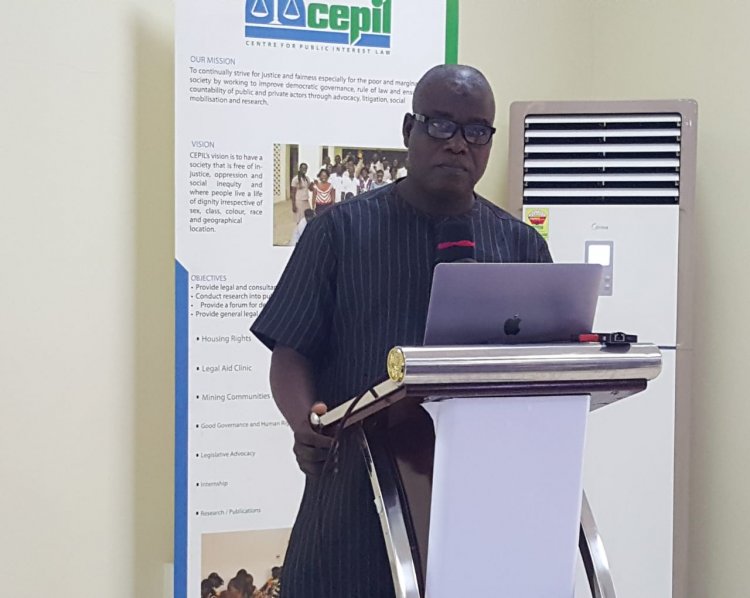CEPIL, Oxfam In Ghana Sensitise Journalists On Manual On Human Rights and Legal Protection
The training, held in Accra on Tuesday, August 22, 2023, was organised by not-for-profit organisation, Centre for Public Interest Law (CEPIL), in collaboration with Oxfam in Ghana.

Journalists from selected media houses in Accra have been sensitised on a new Manual on Human Rights and Legal Protection Protocols for civil society organisation (CSO) partners and Human Rights Defenders (HRDs).
The training, held in Accra on Tuesday, August 22, 2023, was organised by not-for-profit organisation, Centre for Public Interest Law (CEPIL), in collaboration with Oxfam in Ghana.
It was designed to strengthen the capacity of journalists on prevention and mitigation measures when faced with situations of risk.
Key highlights of the manual include the need for HRDs to be conscious of their safety in every endeavour; to communicate and escalate any threat to the CSOs community; the responsibility of the government to offer protection for HRDs; employers of CSOs must put in place measures to protect the lives of their staff members, and capacity building through training programmes for HRDs.
Others are the need for donors and partners to prioritise funding to build systems that provide security for HRDs and CSOs, and for HRDs to cease, track, monitor and prevent or mitigate threats.
The Executive Director of CEPIL, Lawyer Augustine Niber, said at the one-day training that the media plays a critical role in advocacy, promotion and protection of human rights.
He however, said journalists and CSOs do this at high risk to themselves, their families and communities and the organisations they represent, hence the shrinking of the civic space.
He attributed the shrinking of the civic space to the increasing reports of human rights abuses against media practitioners and CSO advocates whose job focuses on defending the rights of others.
According to him, these human rights abuses have included violations, physical attacks, right abuses and threats to integrity of human rights defenders.
He explained that it was against the backdrop of attacks on HRDs that CEPIL and Oxfam in Ghana developed this manual to help improve on the protection of HRDs and those involved in influencing.
Speaking to the media on the sidelines of the training, Lawyer Alhassan Iddrisu, a speakers at the forum, noted that both the CSOs and the media must be given the “freedom” to work.
He indicated that the role of the media and CSOs in defending the rights of others cannot be underestimated.
He said the 1992 Constitution provides protection of the media and every Ghanaian citizen, urging the participants to take the manual seriously.
“…the Constitution provides the protection of the media and of every person in Ghana so we have highlighted all this in the manual as a guide in our work, and we must take it seriously because our lives matter. We don’t need to continue to lose the lives of human rights defenders who include the journalists,” he averred.
He, therefore, stressed the need for the media to be protected to enable them promote Ghana’s democracy, human rights and serve as advocates for the vulnerable.
Lawyer Iddrisu said HRDs in the course of their work are confronted with very high risks which sometimes cut short their lives.
He sadly recounted that in 2019 over 281 human rights defenders lost their lives in the country while in the line of duty.
“I mean they don’t have any personal motive; what they seek to do is to protect the lives and human rights of the vulnerable in our communities. And, therefore, the state that is a signatory to the United Nations Declaration has a duty and a mandate to protect the rights of these Human Rights Defenders. And these include media, CSOs, lawyers, anti-corruption crusaders. We all are important and our lives matter as we also work towards protecting and promoting the human rights of the vulnerable in society,” he said.
On what journalists must do to prevent attacks on them, Lawyer Iddrisu advised that the media must assess every situation, especially those involved in investigative journalism.
“This is because they (referring to investigative journalists) go to isolated places to bring news. They endanger their lives going to people’s homes, offices for interviews, to collect data, and information for the consumption of the public. Therefore, they must be aware that as they do this their lives matter and must exist to continue to do the work, and risk assessment should be used to assess every situation, and must equally abide by their ethics,” he cautioned.
Earlier, Lawyer Iddrisu took the participants through presentations on “Understanding the Challenges and Experiences in Human Rights Advocacy and Influencing Work” and The Role of Human Rights and Legal Protection Protocols in Pursuit of Justice and Human Rights Advocacy. The participants were given copies of the manual.

 Freeman Koryekpor
Freeman Koryekpor 



































